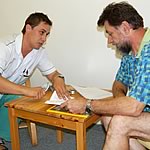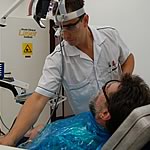Snoring. Perhaps the biggest nightmare of shared bedrooms. Thousands of guaranteed home remedies and ideas about how to get rid of this problem inevitably fail. Furthermore, current findings indicate that snoring has not only social consequences but also health ones. Can the problem of snoring actually be solved? What causes snoring? These are the questions being asked over and over again by those concerned.

What causes snoring?
Snoring is a noisy sound occurring during sleep and caused by a vibration of tissues in the air passages. Inhaled and exhaled air makes the sides of pharynx or the soft palate and throat flap and vibrate.
Should snoring be treated?
The snoring itself is not a disease but rather a cosmetic defect with social consequences. Some percentage of snorers have a more serious malfunction though. People who snore may suffer from sleep apnea syndrome. This is characterized by pauses in breathing throughout the night, which may have serious health consequences. Not only does the patient suffer by snoring but also from headaches, daytime tiredness, excessive sleepiness, memory and learning problems, sexual dysfunction, high blood pressure and so on. An accurate examination is essential for a diagnosis of sleep apnea and determining possible treatment options. In other cases the treatment depends on the need of the patient to deal with his social or cosmetic problem.

What are the treatment options?
General recommendations such as reducing overweight or eliminating sleeping pills may help to solve or eliminate snoring and to a certain extent even sleep apnea syndrome. Some patients are treated for obstructed nasal air waves (a nose bridge plastic or nasal polyps treatment), sometimes it is necessary to remove tonsils or adenoids. In some cases snoring is caused by chronic cold which can be also treated by a laser or another outpatient surgery.
What surgical interventions are used?
The most important interventions are in the soft palate area. At present, this kind of operation is the most common method worldwide, with a very high success rate and a small risk of complications. There have been surgical methods extending the area behind the tongue, though these are intended for severe cases of sleep apnea.

Can you explain laser surgery of the soft palate in more detail?
Thorough examination is of course a prerequisite, the actual intervention is then carried out under local anesthesia and mostly without hospitalization. The process is painless with minimum bleeding. During the operation a new palate including the throat flap is formed (see pictures 1,2,3), then the post-operative healing results in its stabilization.
During the post-operative period pain or pressure may arise, which is controlled and suppressed with analgesics. Pain intensity and its duration depends on the surgical instrument being used. In some cases a laser is suitable, in other PLASMA or Radio-frequency works better. The advanced equipment we have at our disposal significantly improves post-operative recovery and reduces any pain or discomfort. The majority of patients are able to return to work within a few days. First after a couple of weeks we evaluate the lasting effect, and we are happy to say that results are in most cases very good. A treatment indication as well as actual surgery is always carried out by one and the same doctor. We also ensure that post-operative home care is provided including follow-up checks.








